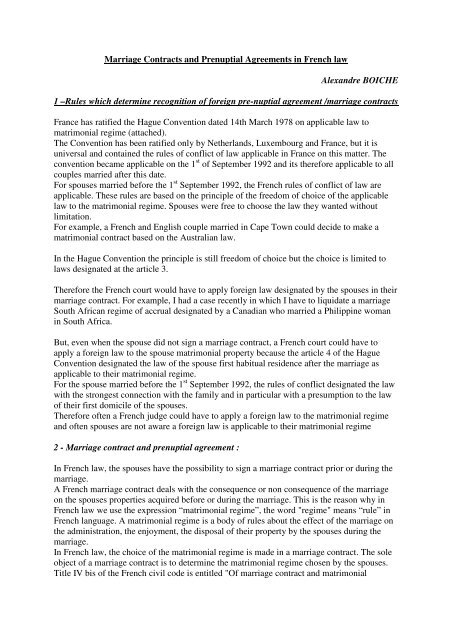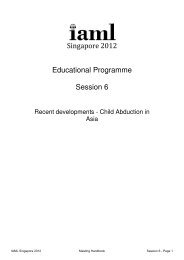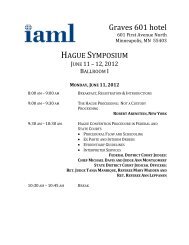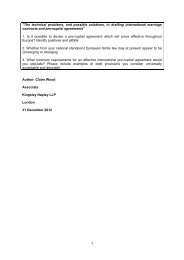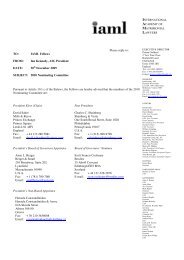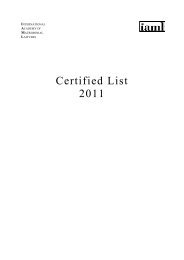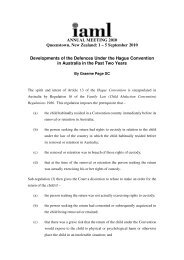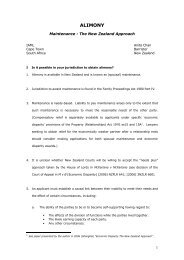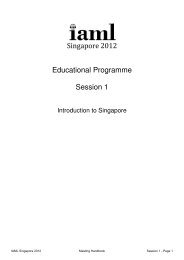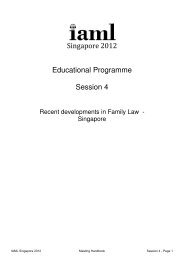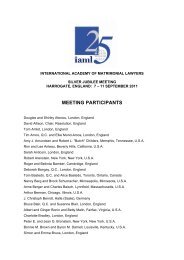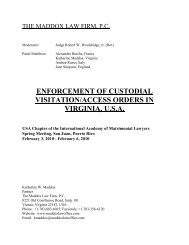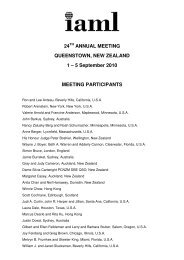Marriage Contracts and Prenuptial Agreements in French law ...
Marriage Contracts and Prenuptial Agreements in French law ...
Marriage Contracts and Prenuptial Agreements in French law ...
Create successful ePaper yourself
Turn your PDF publications into a flip-book with our unique Google optimized e-Paper software.
<strong>Marriage</strong> <strong>Contracts</strong> <strong>and</strong> <strong>Prenuptial</strong> <strong>Agreements</strong> <strong>in</strong> <strong>French</strong> <strong>law</strong><br />
Alex<strong>and</strong>re BOICHE<br />
1 –Rules which determ<strong>in</strong>e recognition of foreign pre-nuptial agreement /marriage contracts<br />
France has ratified the Hague Convention dated 14th March 1978 on applicable <strong>law</strong> to<br />
matrimonial regime (attached).<br />
The Convention has been ratified only by Netherl<strong>and</strong>s, Luxembourg <strong>and</strong> France, but it is<br />
universal <strong>and</strong> conta<strong>in</strong>ed the rules of conflict of <strong>law</strong> applicable <strong>in</strong> France on this matter. The<br />
convention became applicable on the 1 st of September 1992 <strong>and</strong> its therefore applicable to all<br />
couples married after this date.<br />
For spouses married before the 1 st September 1992, the <strong>French</strong> rules of conflict of <strong>law</strong> are<br />
applicable. These rules are based on the pr<strong>in</strong>ciple of the freedom of choice of the applicable<br />
<strong>law</strong> to the matrimonial regime. Spouses were free to choose the <strong>law</strong> they wanted without<br />
limitation.<br />
For example, a <strong>French</strong> <strong>and</strong> English couple married <strong>in</strong> Cape Town could decide to make a<br />
matrimonial contract based on the Australian <strong>law</strong>.<br />
In the Hague Convention the pr<strong>in</strong>ciple is still freedom of choice but the choice is limited to<br />
<strong>law</strong>s designated at the article 3.<br />
Therefore the <strong>French</strong> court would have to apply foreign <strong>law</strong> designated by the spouses <strong>in</strong> their<br />
marriage contract. For example, I had a case recently <strong>in</strong> which I have to liquidate a marriage<br />
South African regime of accrual designated by a Canadian who married a Philipp<strong>in</strong>e woman<br />
<strong>in</strong> South Africa.<br />
But, even when the spouse did not sign a marriage contract, a <strong>French</strong> court could have to<br />
apply a foreign <strong>law</strong> to the spouse matrimonial property because the article 4 of the Hague<br />
Convention designated the <strong>law</strong> of the spouse first habitual residence after the marriage as<br />
applicable to their matrimonial regime.<br />
For the spouse married before the 1 st September 1992, the rules of conflict designated the <strong>law</strong><br />
with the strongest connection with the family <strong>and</strong> <strong>in</strong> particular with a presumption to the <strong>law</strong><br />
of their first domicile of the spouses.<br />
Therefore often a <strong>French</strong> judge could have to apply a foreign <strong>law</strong> to the matrimonial regime<br />
<strong>and</strong> often spouses are not aware a foreign <strong>law</strong> is applicable to their matrimonial regime<br />
2 - <strong>Marriage</strong> contract <strong>and</strong> prenuptial agreement :<br />
In <strong>French</strong> <strong>law</strong>, the spouses have the possibility to sign a marriage contract prior or dur<strong>in</strong>g the<br />
marriage.<br />
A <strong>French</strong> marriage contract deals with the consequence or non consequence of the marriage<br />
on the spouses properties acquired before or dur<strong>in</strong>g the marriage. This is the reason why <strong>in</strong><br />
<strong>French</strong> <strong>law</strong> we use the expression “matrimonial regime”, the word "regime" means “rule” <strong>in</strong><br />
<strong>French</strong> language. A matrimonial regime is a body of rules about the effect of the marriage on<br />
the adm<strong>in</strong>istration, the enjoyment, the disposal of their property by the spouses dur<strong>in</strong>g the<br />
marriage.<br />
In <strong>French</strong> <strong>law</strong>, the choice of the matrimonial regime is made <strong>in</strong> a marriage contract. The sole<br />
object of a marriage contract is to determ<strong>in</strong>e the matrimonial regime chosen by the spouses.<br />
Title IV bis of the <strong>French</strong> civil code is entitled "Of marriage contract <strong>and</strong> matrimonial
egime". Therefore <strong>in</strong> <strong>French</strong> legal language it is the same th<strong>in</strong>g to speak about “marriage<br />
contract” <strong>and</strong> “matrimonial regime”. The first refers necessarily to the second.<br />
There are three ma<strong>in</strong> types of matrimonial regime def<strong>in</strong>ed <strong>in</strong> the <strong>French</strong> civil Code :<br />
community regime, regime of separation <strong>in</strong> acquisitions, separation of the assets.<br />
But the spouse are free to agree on an other type or contract, for example they could choose a<br />
community contract <strong>and</strong> decide this community will be divide unequally.<br />
But a marriage contract <strong>in</strong> <strong>French</strong> <strong>law</strong> only relates to the spouses’ properties, normally it does<br />
not conta<strong>in</strong> any stipulation about the amount of ma<strong>in</strong>tenance <strong>in</strong> case of divorce or separation.<br />
A <strong>French</strong> court will be probably reluctant to enforce this k<strong>in</strong>d of stipulation from a foreign<br />
prenuptial agreement. This k<strong>in</strong>d of stipulation could be <strong>in</strong>terpreted as contrary to the <strong>French</strong><br />
public policy. There is no case <strong>law</strong> on this matter. To avoid any risk, between European<br />
countries, I advise the parties to designate a jurisdiction to deal with the ma<strong>in</strong>tenance issue <strong>in</strong><br />
application of the prenuptial agreement, this designation is possible <strong>and</strong> b<strong>in</strong>d<strong>in</strong>g <strong>in</strong> application<br />
of the article 23 of the European regulation on jurisdiction, recognition <strong>and</strong> enforcement <strong>in</strong><br />
civil <strong>and</strong> commercial matters (Brussels I).<br />
In an <strong>in</strong>ternational case, I am very reluctant to advise the parties to sign more than one<br />
prenuptial agreement, because if the <strong>French</strong> courts would have to hear the case, they would<br />
not take <strong>in</strong>to account the <strong>French</strong> prenuptial agreement but the more recent one. The Hague<br />
Convention allows the spouse to sign a specific contract to designate the <strong>law</strong> of a country <strong>in</strong><br />
which they have some immovable, for these properties <strong>and</strong> the ones they may acquire.<br />
This is sole situation <strong>in</strong> which the Hague Convention gives to the spouse the opportunity to<br />
sign more than one contract <strong>and</strong> to designate more than one applicable <strong>law</strong>.<br />
The Hague Convention conta<strong>in</strong>s also some rules about the automatic change of applicable <strong>law</strong><br />
(articles 4 <strong>and</strong> 7) which makes me strongly recommend sign<strong>in</strong>g a prenuptial agreement to<br />
every potential <strong>in</strong>ternational couple who wants to get married.<br />
Alex<strong>and</strong>re BOICHE<br />
Docteur en Droit – Avocat à la Cour<br />
Cab<strong>in</strong>et CHAUVEAU<br />
8, boulevard Sébastopol -75005 PARIS<br />
Tél. 33 1 55 42 55 25 Fax 33 1 55 42 55 29<br />
Email : a.boiche@droitfamille.com
CONVENTION ON THE LAW APPLICABLE TO MATRIMONIAL PROPERTY REGIMES<br />
(Concluded 14 March 1978)<br />
(Entered <strong>in</strong>to force 1 September 1992)<br />
The States signatory to this Convention,<br />
Desir<strong>in</strong>g to establish common provisions concern<strong>in</strong>g the <strong>law</strong> applicable to matrimonial property regimes,<br />
Have resolved to conclude a Convention for this purpose <strong>and</strong> have agreed upon the follow<strong>in</strong>g provisions –<br />
CHAPTER I - SCOPE OF THE CONVENTION<br />
Article 1<br />
This Convention determ<strong>in</strong>es the <strong>law</strong> applicable to matrimonial property regimes.<br />
The Convention does not apply to –<br />
(1) ma<strong>in</strong>tenance obligations between spouses;<br />
(2) succession rights of a surviv<strong>in</strong>g spouse;<br />
(3) the capacity of the spouses.<br />
Article 2<br />
The Convention applies even if the nationality or the habitual residence of the spouses or the <strong>law</strong> to be applied by<br />
virtue of the follow<strong>in</strong>g Articles is not that of a Contract<strong>in</strong>g State.<br />
CHAPTER II – APPLICABLE LAW<br />
Article 3<br />
The matrimonial property regime is governed by the <strong>in</strong>ternal <strong>law</strong> designated by the spouses before marriage.<br />
The spouses may designate only one of the follow<strong>in</strong>g <strong>law</strong>s –<br />
(1) the <strong>law</strong> of any State of which either spouse is a national at the time of designation;<br />
(2) the <strong>law</strong> of the State <strong>in</strong> which either spouse has his habitual residence at the time of designation;<br />
(3) the <strong>law</strong> of the first State where one of the spouses establishes a new habitual residence after marriage.<br />
The <strong>law</strong> thus designated applies to the whole of their property.<br />
Nonetheless, the spouses, whether or not they have designated a <strong>law</strong> under the previous paragraphs, may<br />
designate with respect to all or some of the immovables, the <strong>law</strong> of the place where these immovables are<br />
situated. They may also provide that any immovables which may subsequently be acquired shall be governed by<br />
the <strong>law</strong> of the place where such immovables are situated.<br />
Article 4<br />
If the spouses, before marriage, have not designated the applicable <strong>law</strong>, their matrimonial property regime is<br />
governed by the <strong>in</strong>ternal <strong>law</strong> of the State <strong>in</strong> which both spouses establish their first habitual residence after<br />
marriage.<br />
Nonetheless, <strong>in</strong> the follow<strong>in</strong>g cases, the matrimonial property regime is governed by the <strong>in</strong>ternal <strong>law</strong> of the State<br />
of the common nationality of the spouses –<br />
(1) where the declaration provided for <strong>in</strong> Article 5 has been made by that State <strong>and</strong> its application to the spouses is<br />
not excluded by the provisions of the second paragraph of that Article;<br />
(2) where that State is not a Party to the Convention <strong>and</strong> accord<strong>in</strong>g to the rules of private <strong>in</strong>ternational <strong>law</strong> of that<br />
State its <strong>in</strong>ternal <strong>law</strong> is applicable, <strong>and</strong> the spouses establish their first habitual residence after marriage –<br />
a) <strong>in</strong> a State which has made the declaration provided for <strong>in</strong> Article 5, or<br />
b) <strong>in</strong> a State which is not a Party to the Convention <strong>and</strong> whose rules of private <strong>in</strong>ternational <strong>law</strong> also provide for<br />
the application of the <strong>law</strong> of their nationality;
(3) where the spouses do not establish their first habitual residence after marriage <strong>in</strong> the same State.<br />
If the spouses do not have their habitual residence <strong>in</strong> the same State, nor have a common nationality, their<br />
matrimonial property regime is governed by the <strong>in</strong>ternal <strong>law</strong> of the State with which, tak<strong>in</strong>g all circumstances <strong>in</strong>to<br />
account, it is most closely connected.<br />
Article 5<br />
Any State may, not later than the moment of ratification, acceptance, approval or accession, make a declaration<br />
requir<strong>in</strong>g the application of its <strong>in</strong>ternal <strong>law</strong> accord<strong>in</strong>g to sub-paragraph 1 of the second paragraph of Article 4.<br />
This declaration shall not apply to spouses who both reta<strong>in</strong> their habitual residence <strong>in</strong> the State <strong>in</strong> which they have<br />
both had their habitual residence at the time of marriage for a period of not less than five years, unless that State is<br />
a Contract<strong>in</strong>g State which has made the declaration provided for <strong>in</strong> the first paragraph of this Article, or is a State<br />
which is not a Party to the Convention <strong>and</strong> whose rules of private <strong>in</strong>ternational <strong>law</strong> require the application of the<br />
national <strong>law</strong>.<br />
Article 6<br />
Dur<strong>in</strong>g marriage the spouses may subject their matrimonial property regime to an <strong>in</strong>ternal <strong>law</strong> other than that<br />
previously applicable.<br />
The spouses may designate only one of the follow<strong>in</strong>g <strong>law</strong>s –<br />
(1) the <strong>law</strong> of any State of which either spouse is a national at the time of designation;<br />
(2) the <strong>law</strong> of the State <strong>in</strong> which either spouse has his habitual residence at the time of designation.<br />
The <strong>law</strong> thus designated applies to the whole of their property.<br />
Nonetheless, the spouses, whether or not they have designated a <strong>law</strong> under the previous paragraphs or under<br />
Article 3, may designate with respect to all or some of the immovables, the <strong>law</strong> of the place where these<br />
immovables are situated. They may also provide that any immovables which may subsequently be acquired shall<br />
be governed by the <strong>law</strong> of the place where such immovables are situated.<br />
Article 7<br />
The <strong>law</strong> applicable under the Convention cont<strong>in</strong>ues to apply so long as the spouses have not designated a different<br />
applicable <strong>law</strong> <strong>and</strong> notwithst<strong>and</strong><strong>in</strong>g any change of their nationality or habitual residence.<br />
Nonetheless, if the spouses have neither designated the applicable <strong>law</strong> nor concluded a marriage contract, the<br />
<strong>in</strong>ternal <strong>law</strong> of the State <strong>in</strong> which they both have their habitual residence shall become applicable, <strong>in</strong> place of the<br />
<strong>law</strong> previously applicable –<br />
(1) when that habitual residence is established <strong>in</strong> that State, if the nationality of that State is their common<br />
nationality, or otherwise from the moment they become nationals of that State, or<br />
(2) when, after the marriage, that habitual residence has endured for a period of not less than ten years, or<br />
(3) when that habitual residence is established, <strong>in</strong> cases when the matrimonial property regime was subject to the<br />
<strong>law</strong> of the State of the common nationality solely by virtue of sub-paragraph 3 of the second paragraph of Article<br />
4.<br />
Article 8<br />
A change of applicable <strong>law</strong> pursuant to the second paragraph of Article 7 shall have effect only for the future, <strong>and</strong><br />
property belong<strong>in</strong>g to the spouses before the change is not subject to the new applicable <strong>law</strong>.<br />
Nonetheless, the spouses may at any time, employ<strong>in</strong>g the forms available under Article 13, subject the whole of<br />
their property to the new <strong>law</strong>, without prejudice, with respect to immovables, to the provisions of the fourth<br />
paragraph of Article 3 <strong>and</strong> the fourth paragraph of Article 6. The exercise of this option shall not adversely affect<br />
the rights of third parties.<br />
Article 9<br />
The effects of the matrimonial property regime on the legal relations between a spouse <strong>and</strong> a third party are<br />
governed by the <strong>law</strong> applicable to the matrimonial property regime <strong>in</strong> accordance with the Convention.
Nonetheless, the <strong>law</strong> of a Contract<strong>in</strong>g State may provide that the <strong>law</strong> applicable to the matrimonial property<br />
regime may not be relied upon by a spouse aga<strong>in</strong>st a third party where either that spouse or the third party has his<br />
habitual residence <strong>in</strong> its territory, unless<br />
(1) any requirements of publicity or registration specified by that <strong>law</strong> have been complied with, or<br />
(2) the legal relations between that spouse <strong>and</strong> the third party arose at a time when the third party either knew or<br />
should have known of the <strong>law</strong> applicable to the matrimonial property regime.<br />
The <strong>law</strong> of a Contract<strong>in</strong>g State where an immovable is situated may provide an analogous rule for the legal<br />
relations between a spouse <strong>and</strong> a third party as regards that immovable.<br />
A Contract<strong>in</strong>g State may specify by declaration the scope of the second <strong>and</strong> third paragraphs of this Article.<br />
Article 10<br />
Any requirements relat<strong>in</strong>g to the consent of the spouses to the <strong>law</strong> designated as applicable shall be determ<strong>in</strong>ed by<br />
that <strong>law</strong>.<br />
Article 11<br />
The designation of the applicable <strong>law</strong> shall be by express stipulation, or arise by necessary implication from the<br />
provisions of a marriage contract.<br />
Article 12<br />
The marriage contract is valid as to form if it complies either with the <strong>in</strong>ternal <strong>law</strong> applicable to the matrimonial<br />
property regime, or with the <strong>in</strong>ternal <strong>law</strong> of the place where it was made. In any event, the marriage contract shall<br />
be <strong>in</strong> writ<strong>in</strong>g, dated <strong>and</strong> signed by both spouses.<br />
Article 13<br />
The designation of the applicable <strong>law</strong> by express stipulation shall comply with the form prescribed for marriage<br />
contracts, either by the <strong>in</strong>ternal <strong>law</strong> designated by the spouses, or by the <strong>in</strong>ternal <strong>law</strong> of the place where it is made.<br />
In any event, the designation shall be <strong>in</strong> writ<strong>in</strong>g, dated <strong>and</strong> signed by both spouses.<br />
Article 14<br />
The application of the <strong>law</strong> determ<strong>in</strong>ed by the Convention may be refused only if it is manifestly <strong>in</strong>compatible<br />
with public policy ("ordre public").<br />
CHAPTER III – MISCELLANEOUS PROVISIONS<br />
Article 15<br />
For the purposes of the Convention, a nationality shall be considered the common nationality of the spouses only<br />
<strong>in</strong> the follow<strong>in</strong>g circumstances –<br />
(1) where both spouses had that nationality before marriage;<br />
(2) where one spouse voluntarily has acquired the nationality of the other at the time of marriage or later, either by<br />
a declaration to that effect or by not exercis<strong>in</strong>g a right known to him or her to decl<strong>in</strong>e the acquisition of the new<br />
nationality;<br />
(3) where both spouses voluntarily have acquired that nationality after marriage.<br />
Except <strong>in</strong> the cases referred to <strong>in</strong> sub-paragraph 1 of the second paragraph of Article 7, the provisions referr<strong>in</strong>g to<br />
the common nationality of the spouses are not applicable where the spouses have more than one common<br />
nationality.<br />
Article 16<br />
For the purposes of the Convention, where a State has two or more territorial units <strong>in</strong> which different systems of<br />
<strong>law</strong> apply to matrimonial property regimes, any reference to the national <strong>law</strong> of such a State shall be construed as<br />
referr<strong>in</strong>g to the system determ<strong>in</strong>ed by the rules <strong>in</strong> force <strong>in</strong> that State.
In the absence of such rules, a reference to the State of which a spouse is a national shall be construed, for the<br />
purposes of sub-paragraph 1 of the second paragraph of Article 3 <strong>and</strong> sub-paragraph 1 of the second paragraph of<br />
Article 6, as referr<strong>in</strong>g to the territorial unit where that spouse had his or her last habitual residence; <strong>and</strong>, for the<br />
purposes of the second paragraph of Article 4, a reference to the State of the common nationality of the spouses<br />
shall be construed as referr<strong>in</strong>g to the last territorial unit, if any, where each has had a habitual residence.<br />
Article 17<br />
For the purposes of the Convention, where a State has two or more territorial units <strong>in</strong> which different systems of<br />
<strong>law</strong> apply to matrimonial property regimes, any reference to habitual residence <strong>in</strong> that State shall be construed as<br />
referr<strong>in</strong>g to habitual residence <strong>in</strong> a territorial unit of that State.<br />
Article 18<br />
A Contract<strong>in</strong>g State which has two or more territorial units <strong>in</strong> which different systems of <strong>law</strong> apply to<br />
matrimonial property regimes shall not be bound to apply the rules of the Convention to conflicts between the<br />
<strong>law</strong>s of such units where the <strong>law</strong> of no other State is applicable by virtue of the Convention.<br />
Article 19<br />
For the purposes of the Convention, where a State has two or more legal systems applicable to the matrimonial<br />
property regimes of different categories of persons, any reference to the <strong>law</strong> of such State shall be construed as<br />
referr<strong>in</strong>g to the system determ<strong>in</strong>ed by the rules <strong>in</strong> force <strong>in</strong> that State.<br />
In the absence of such rules, the <strong>in</strong>ternal <strong>law</strong> of the State of the common nationality of the spouses applies under<br />
the circumstances referred to <strong>in</strong> the first paragraph of Article 4, <strong>and</strong> the <strong>in</strong>ternal <strong>law</strong> of the State where each has<br />
had a habitual residence cont<strong>in</strong>ues to apply under the circumstances referred to <strong>in</strong> sub-paragraph 2 of the second<br />
paragraph of Article 7. In the absence of a common nationality of the spouses, the third paragraph of Article 4<br />
applies.<br />
Article 20<br />
The Convention shall not affect any other <strong>in</strong>ternational <strong>in</strong>strument conta<strong>in</strong><strong>in</strong>g provisions on matters governed by<br />
this Convention to which a Contract<strong>in</strong>g State is, or becomes, a Party.<br />
Article 21<br />
The Convention applies, <strong>in</strong> each Contract<strong>in</strong>g State, only to spouses who have married or who designate the <strong>law</strong><br />
applicable to their matrimonial property regime after the Convention enters <strong>in</strong>to force for that State.<br />
A Contract<strong>in</strong>g State may by declaration extend the application of the Convention to other spouses.<br />
CHAPTER IV – FINAL CLAUSES<br />
Article 22<br />
The Convention is open for signature by the States which were Members of the Hague Conference on Private<br />
International Law at the time of its Thirteenth Session.<br />
It shall be ratified, accepted or approved <strong>and</strong> the <strong>in</strong>struments of ratification, acceptance or approval shall be<br />
deposited with the M<strong>in</strong>istry of Foreign Affairs of the Netherl<strong>and</strong>s.<br />
Article 23<br />
Any other State may accede to the Convention.<br />
The <strong>in</strong>strument of accession shall be deposited with the M<strong>in</strong>istry of Foreign Affairs of the Netherl<strong>and</strong>s.<br />
Article 24<br />
Any State may, at the time of signature, ratification, acceptance, approval or accession, declare that the<br />
Convention shall extend to all the territories for the <strong>in</strong>ternational relations of which it is responsible, or to one or<br />
more of them. Such a declaration shall take effect at the time the Convention enters <strong>in</strong>to force for that State.
Such declaration, as well as any subsequent extension, shall be notified to the M<strong>in</strong>istry of Foreign Affairs of the<br />
Netherl<strong>and</strong>s.<br />
Article 25<br />
A Contract<strong>in</strong>g State which has two or more territorial units <strong>in</strong> which different systems of <strong>law</strong> apply to<br />
matrimonial property regimes may, at the time of signature, ratification, acceptance, approval or accession,<br />
declare that the Convention shall apply to all its territorial units or only to one or more of them, <strong>and</strong> may extend<br />
its declaration at any time thereafter.<br />
These declarations shall be notified to the M<strong>in</strong>istry of Foreign Affairs of the Netherl<strong>and</strong>s, <strong>and</strong> shall state expressly<br />
the territorial unit to which the Convention applies.<br />
Article 26<br />
A Contract<strong>in</strong>g State hav<strong>in</strong>g at the date of the entry <strong>in</strong>to force of the Convention for that State a complex system of<br />
national allegiance may specify from time to time by declaration how a reference to its national <strong>law</strong> shall be<br />
construed for the purposes of the Convention.<br />
Article 27<br />
No reservation to the Convention shall be permitted.<br />
Article 28<br />
Any Contract<strong>in</strong>g State desir<strong>in</strong>g to make one of the declarations envisaged by Article 5, the fourth paragraph of<br />
Article 9, Article 21 or Article 26 shall notify such declaration to the M<strong>in</strong>istry of Foreign Affairs of the<br />
Netherl<strong>and</strong>s.<br />
Notice shall be given <strong>in</strong> the same manner of any modification or withdrawal of such a declaration.<br />
Article 29<br />
The Convention shall enter <strong>in</strong>to force on the first day of the third calendar month after the deposit of the third<br />
<strong>in</strong>strument of ratification, acceptance, approval or accession referred to <strong>in</strong> Articles 22 <strong>and</strong> 23.<br />
Thereafter the Convention shall enter <strong>in</strong>to force –<br />
(1) for each State ratify<strong>in</strong>g, accept<strong>in</strong>g, approv<strong>in</strong>g or acced<strong>in</strong>g to it subsequently, on the first day of the third<br />
calendar month after the deposit of its <strong>in</strong>strument of ratification, acceptance, approval or accession;<br />
(2) for a territory to which the Convention has been extended <strong>in</strong> conformity with Article 24, on the first day of the<br />
third calendar month after the notification referred to <strong>in</strong> that Article.<br />
Article 30<br />
The Convention shall rema<strong>in</strong> <strong>in</strong> force for five years from the date of its entry <strong>in</strong>to force <strong>in</strong> accordance with the<br />
first paragraph of Article 29, even for States which subsequently have ratified, accepted, approved it or acceded to<br />
it.<br />
If there has been no denunciation, it shall be renewed tacitly every five years.<br />
Any denunciation shall be notified to the M<strong>in</strong>istry of Foreign Affairs of the Netherl<strong>and</strong>s, at least six months<br />
before the expiry of the five year period. It may be limited to certa<strong>in</strong> of the territories or territorial units to which<br />
the Convention applies.<br />
The denunciation shall have effect only as regards the State which has notified it. The Convention shall rema<strong>in</strong> <strong>in</strong><br />
force for the other Contract<strong>in</strong>g States.<br />
Article 31<br />
The M<strong>in</strong>istry of Foreign Affairs of the Netherl<strong>and</strong>s shall notify the States Members of the Conference, <strong>and</strong> the<br />
States which have acceded <strong>in</strong> accordance with Article 23, of the follow<strong>in</strong>g –<br />
(1) the signatures <strong>and</strong> ratifications, acceptances <strong>and</strong> approvals referred to <strong>in</strong> Article 22;
(2) the accessions referred to <strong>in</strong> Article 23;<br />
(3) the date on which the Convention enters <strong>in</strong>to force <strong>in</strong> accordance with Article 29;<br />
(4) the extensions referred to <strong>in</strong> Article 24;<br />
(5) the denunciations referred to <strong>in</strong> Article 30;<br />
(6) the declarations referred to <strong>in</strong> Articles 25, 26 <strong>and</strong> 28.<br />
In witness whereof the undersigned, be<strong>in</strong>g duly authorised thereto, have signed this Convention.<br />
Done at The Hague, on the 14th day of March, 1978, <strong>in</strong> the English <strong>and</strong> <strong>French</strong> languages, both texts be<strong>in</strong>g<br />
equally authentic, <strong>in</strong> a s<strong>in</strong>gle copy which shall be deposited <strong>in</strong> the archives of the Government of the Netherl<strong>and</strong>s,<br />
<strong>and</strong> of which a certified copy shall be sent, through the diplomatic channel, to each of the States Members of the<br />
Hague Conference on Private International Law at the date of its Thirteenth Session.


